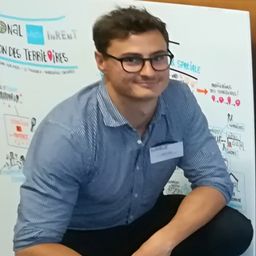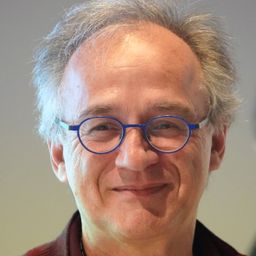
Robin Lesné holds a Ph.D. in Spatial planning and Urbanism of the Université du Littoral Côte d'Opale (France) and the laboratory TVES (Territoires, Villes, Environnement & Société ULR4477). He holds a master's degree in spatial planning and urbanism. Robin does interdisciplinary research in Geography, Urban Planning, Urban Sociology, and Urban Sports. His thesis project, co-directed by Christophe Gibout and Florian Lebreton (ULCO-TVES), focuses on the recreational city. It aims to understand the evolution of the use of urban spaces by transgressive leisure activities (parkour and urbex) and to highlight the daily construction of the recreational city while questioning its recognition, acceptance, and consideration by public authorities.
Articles
- Le Gallou, A. et Lesné, R. (in press). Urbex 404 – Interroger la valeur des espaces délaissés par l’exploration urbaine. Urbanités, 17.
- Lesné, R., Frotey, J., Guerrero, J., Haquet, J., Hiliquin, M. et Masclef, E. (in press). Introduction du dossier spécial « Crises et Espaces : questionnements, implications et effets ». Contributions issues de la Journée d’études doctorales (3 juin 2021, Université de Lille). Riséo, 2022-1.
- Lesné, R. (2019). Le parkour, une pratique au service de la participation juvénile en ville ? Dissidence récréative et affirmation des jeunes à Rennes et à Nantes. L’Information Géographique, 83(3), 83-105.
- Lesné, R. (2019). Quand le déplacement devient une fin en soi. La pratique du parkour, une mobilité qui fait bouger l’urbanité. Urbanités, 11. http://www.revue-urbanites.fr/11-lesne/
- Lesné, R., Gibout, C. et Lebreton, F. (2019). Du skate-park au parkour-park : les espaces dédiés pour les activités ludo-sportives comme outils d’aménagement ? Etudes de cas à Nantes et à Rennes. Loisir et Société, 42(3), 378-400.
Chapters
- Lesné, R. (2021). Les pratiques ludo-sportives, des ressources territoriales innovantes pour le tourisme : le parkour à Roubaix. Dans V. Herbert (dir.), Tourisme et territoires. Espaces d’innovation (p. 385-403). Peter Lang.
International presentations
- Lesné, R. (2022, 28-4 September). L’urbex, une expérience re-créative du patrimoine industriel délaissé [Oral presentation]. 18th International Congress of TICCIH « Industrial Heritage Reloaded », Montréal, QC, Canada.
- Lesné, R. (2022, 28-4 September). Urbex, parkour et patrimoine industriel délaissé : spatialités, pratiques et formes touristiques alternatives [Oral presentation]. 18th International Congress of TICCIH « Industrial Heritage Reloaded », Montréal, QC, Canada.
- Lesné, R. (2022, 18-22 July). Changer les temps et les espaces de l’apprentissage : retour sur une expérience de classe inversée dans un enseignement de géographie à l’université [Oral presentation]. Congrès du Centenaire de l’UGI « Le Temps des Géographes », Paris, France.
- Lesné, R. (2021, 17-19 November). Towards the recreational city? Playful and transgressive urban leisure to rethink dwelling, city planning and urbanity [Oral presentation]. Conférence « Transgression – A new paradigm? », Rennes, France.
National presentations
- Lesné, R. (2022, 25 March). L’espace public, un espace « pour quiconque ». Appréhender l’espace public par une approche socioculturelle de ses pratiques récréatives [Oral presentation]. Journée d’études « Cultures : espaces et pratiques », Paris, France.
- Duranel, G., Le Gallou, A. et Lesné, R. (2021, 16 November). Les pratiques Urbex face à l’expertise savante et aux institutions [Round table]. Journée d’études du réseau LIEU « Urbex Effets socio-territoriaux et politico-économiques », Paris, France.
- Lebreton, F. et Lesné, R. (2019, 7-8 November). Le sport de rue et le « lieu » anthropologique. Dix années de rétrospective sur la ville vécue par les traceurs [Oral presentation]. Congrès AnthropoVilles « La ville et les sciences sociales. Ce que la ville fait à l’anthropologie, ce que l’anthropologie fait à la ville », Lille, France.
- Lesné, R. (2019, 25-27 September). Pratiques ludo-sportives, altertourisme et ressources territoriales innovantes : le parkour à Roubaix [Oral presentation]. Colloque « Tourisme et innovation des territoires », Boulogne-sur-Mer, France.
- Lebreton, M.-A., Le Fur F. et Lesné, R. (2018, 22 January). L’espace périurbain : quelle(s) forme(s) pour la sociabilité ? Etude de cas sur la commune de Laillé [Oral presentation]. Séminaire de recherche « Manifestations spatialisées des sociabilités à l’interface urbain/rural », Rennes, France.
Elementy, w których Robin Lesné uczestniczy
wtorek 30 sierpień, 2022
środa 31 sierpień, 2022
Elementy, w których Robin Lesné attends
niedziela 28 sierpień, 2022
Join the conference organisers and TICCIH board members for a welcome cocktail and some festive words of introduction, in the former forge of the École technique de Montréal, founded in 1909, now part of the Université du Québec à Montréal campus.
poniedziałek 29 sierpień, 2022
This session presents case studies and policy reviews that contribute to ongoing debate and international dialogue on the role of planning systems and conservation practices in addressing the challenges of citizen engagement—conserving local interests, place attachments alongside physical remnants of industrial heritage. Over the past half century, we have witnessed the development and changing focuses of urban planning and conservation discourses addressing industrial heritage. Relevant p...
This session presents case studies and policy reviews that contribute to ongoing debate and international dialogue on the role of planning systems and conservation practices in addressing the challenges of citizen engagement—conserving local interests, place attachments alongside physical remnants of industrial heritage. Over the past half century, we have witnessed the development and changing focuses of urban planning and conservation discourses addressing industrial heritage. Relevant p...
This session presents case studies and policy reviews that contribute to ongoing debate and international dialogue on the role of planning systems and conservation practices in addressing the challenges of citizen engagement—conserving local interests, place attachments alongside physical remnants of industrial heritage. Over the past half century, we have witnessed the development and changing focuses of urban planning and conservation discourses addressing industrial heritage. Relevant p...
wtorek 30 sierpień, 2022
This session will allow us to explore, through nine international case studies, the different strategies for the development of industrial heritage as well as their impacts on communities and their territory. The analysis of museums, cultural spaces, itineraries and urban developments will be an opportunity to highlight the questions of identity, meaning, relevance and impact that animate all the actors of this heritage in transformation.
This session will allow us to explore, through nine international case studies, the different strategies for the development of industrial heritage as well as their impacts on communities and their territory. The analysis of museums, cultural spaces, itineraries and urban developments will be an opportunity to highlight the questions of identity, meaning, relevance and impact that animate all the actors of this heritage in transformation.
This session will allow us to explore, through nine international case studies, the different strategies for the development of industrial heritage as well as their impacts on communities and their territory. The analysis of museums, cultural spaces, itineraries and urban developments will be an opportunity to highlight the questions of identity, meaning, relevance and impact that animate all the actors of this heritage in transformation.
środa 31 sierpień, 2022
The role of industrial heritage in urban development has been extensively acknowledged in guiding and legitimizing the policies and discourses implemented by governments mostly to ensure the continuity between the past, present and future. Mega-events such as sports (e.g. Olympics, World Cup, etc.), cultural (Universal Expositions and national Exhibitions), economic (trade and technology fairs) events are often opportunities used in a top-down process to reinforce the mobilization of the i...
Les friches industrielles sont devenues des figures urbaines ordinaires et témoignent, dans les anciennes puissances industrielles mais aussi dans les pays du Sud, des transformations du tissu urbain ainsi que du fait qu’il y ait processus de qualification, déqualification et, parfois, requalification de ces lieux. Les transformations qui les caractérisent structurent aujourd’hui d’indéniables enjeux politiques, sociologiques, spatiaux et culturels.Dans le cadre de ce congrès dont l...
czwartek 1 wrzesień, 2022
From its construction to its restoration, immerse yourself in the now and then of this key Canadian industrial heritage site. A country’s central maritime route, a major inland port, the Canadian Lowell (using hydraulic power), the cradle of industrialization, Smokey Valley (using steam), a manufacturing hotspot, the Lachine Canal is all of this and more. For it is also a national historic site, for which
The proposed session will examine the unfolding relationship between industrial heritage and those left behind in adjoining deindustrialized working-class areas. The four papers seek to understand the socio-economic and political impact of recognizing the industrial past in the present. Two guiding questions will be asked. Can industrial heritage support those ‘left behind’ in deindustrialized areas where nothing, or very little, has filled the economic or cultural vacuum? Has industrial h...
The proposed session will examine the unfolding relationship between industrial heritage and those left behind in adjoining deindustrialized working-class areas. The four papers seek to understand the socio-economic and political impact of recognizing the industrial past in the present. Two guiding questions will be asked. Can industrial heritage support those ‘left behind’ in deindustrialized areas where nothing, or very little, has filled the economic or cultural vacuum? Has industrial h...

